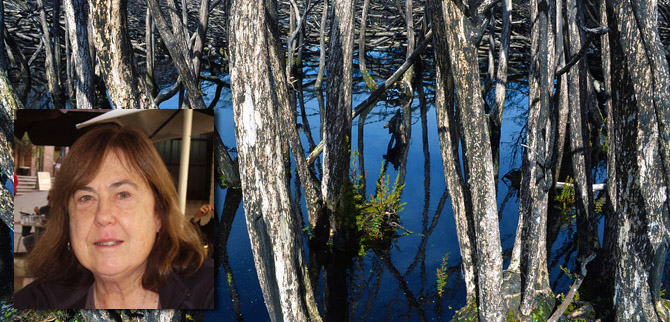The Black Line, poems by Margaret Bradstock
Margaret Bradstock is a Sydney poet, critic and editor. She lectured at UNSW for 25 years and has been Asialink Writer-in-residence at Peking University, co-editor of Five Bells for Poets Union, and on the Board of Directors for Australian Poetry. She has six published collections of poetry, including The Pomelo Tree (winner of the Wesley Michel Wright Prize) and Barnacle Rock (winner of the Woollahra Festival Award, 2014). Editor of Antipodes, the first Australian anthology of Aboriginal and white responses to “settlement” (2011) and Caring for Country (2017), Margaret won the Banjo Paterson Poetry Award in 2014, 2015 and 2017. Her poetry has been widely published in anthologies and journals such as Australian Poetry, Best Poems of 2017, Blue Dog, Canberra Times, Contemporary Australian Poetry, Cordite, Famous Reporter, Island, Mascara, Meanjin, Overland, Plumwood Mountain, Quadrant, Southerly and The Sydney Morning Herald. She has featured in readings at the Sydney Writers Festival.
The Sealers, Preservation Island
‘…to visit the sealers of Bass Strait…to rescue their
stolen native women from slavery and debauchery’
− George Augustus Robinson, 1830
By what irony was this island
named a safe harbour
after the wreck of the Sydney Cove?
Here the sealers hold sway
ex-convicts and scum of the system
wives kidnapped from native tribes
tied to the trees and flogged
their copper-skinned offspring slave labour.
Rather than hand them this life
women murder the children
stuffing their mouths with sand.
Rivers of moonbirds hang over the rescue-boat
flow to the sea, the rocky foreshores,
past islands of tussock grass
teeming rookeries of seals and sea lions
there for the taking, a miasma
of clubbing and skinning
the scrimshaw of discarded bone.
With the sealers out on the straits
the women are up at the bird rookery
gathering firewood, strolling downhill
reluctant to leave the dogs. Once on our boat
the Charlotte, they laugh and sing
glad to be free of their masters.
The smell of bloodshed clings about these islands.
The Whispering Bones
William Lanney, survivor of Wybelenna camp, d.1869 of cholera.
King Billy’s dead, Kater has his head,
Sevitt has his hands and feet.
My feet, my feet, my poor black feet
That used to be so gritty,
They’re not aboard the Runnymede
They’re somewhere in this city .
− popular song, Hobart Town
Dr Crowther took away my head
lowering it from the dead-house window
slipping a white man’s under the black skin
to mask the theft, my bloated features
further distorted with a lipless grin.
Measured precisely, wrapped in a sealskin bundle
shipped off to London Town, my skull
my precious skull, was jettisoned
when it began to stink
wandering the world like an unburied ghost.
Thoughts of possession cluster round dead limbs.
Officials then chopped off my feet and hands
for safe-keeping, trundling them down
to Salamanca Place or, rumour has it,
the Anglo-Australian Guano Company.
Coffin shrouded in the Union Jack
(sealed with dispensary wax and found brass stamp)
shouldered by whalers from Runnymede and Aladdin,
my lopped and bloodied trunk
together with a stranger’s flayed head
was buried
exhumed by body-snatchers the next day.
Kater’s s tobacco pouch (a wondrous thing)
crafted from my skin, the rest dissected
for its skeleton, which disappeared.
What am I now, seeded into the land
like winter crops, my disembodied voices
calling the limbs and skeleton back home,
the ache of a cranium
my people’s avatar.
The Black Line
‘ …to effect the voluntary removal of the entire black
population…to place every last one of them on Flinders Island’
– George Augustus Robinson (Conciliator of Aborigines, 1832)
1.
Walking once more by the river
conjuring the moment
things might have been different, I wonder
why I am known as a Victorian do-gooder
yet achieved so little good.
Even as Arthur’s Black Line surged downwards
martial law declared, the bush
flickering with guard fires, his dragnet capturing
only one man and a boy, it had begun.
Better Truganini had not ferried me to safety
across the Welcome River on a log
when the Port Davey mob attacked with spears.
2.
We journeyed south-east from our base camp
opposite Swan Island, crossed Tomahawk River
and the Montagu, pursuing a course
to the end of the Western Bluff.
With me chief Manna-largenna, recruited
from Hobart Town gaol, Truganini and Wooraddy
nine other aboriginals and two white men
earth’s shadow on the face of the moon
our foreboding. Truganini insists it’s Manna-largenna
killed by the Stoney Creek tribe
and gone up to the moon.
Smoke spiralling from treetops
sighted by our natives, we come to the campfire
of Umarrah, and the last of his melancholy tribe
their women stolen by sealers.
They signal for peace and join us.
I sleep in the open, within a ring
of acrid natives, heartily tired
of this sort of life, my stomach gaseous
unsettled from the stringy wild game.
3.
Frenchman’s Cap its grim volcanic cone
rising thousands of feet above the plain
almost a living thing, with moods of its own
colours of the ice changing
with every shift of the light.
For seven successive days we travel on
through snowy plateaus and passes
often waist-deep in the snow
a miserable journey, for our last roundup
a man, four women and a boy.
The Hobart Town Courier gives due thanks
(the removal of these blacks will be of essential
benefit to themselves and the colony)
farewells them all to Flinders Island
religious instruction, shell-fishing and kangaroo hunts
to occupy their minds.
Yet the settlement becomes a prison camp.
They die of floggings, ill health, homesickness
more shadow than savage crow.
© Margaret Bradstock


